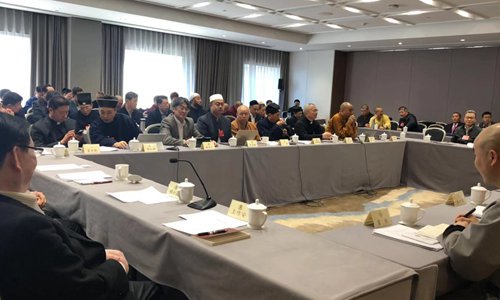
Chinese People's Political Consultative Conference (CPPCC) members from religious circles hold a joint conference on Thursday in Beijing during the two sessions. (Photo: Global Times)
Chinese political advisers from five main religions hailed the country's efforts to promote social stability and vowed to continue adhering to the sinicization of religions and make greater efforts to better integrate religions into the socialist society.
In a panel discussion during the second session of the 13th National Committee of the Chinese People's Political Consultative Conference (CPPCC), Wang Yang, chairman of the CPPCC National Committee, said that religious issues have a bearing on social harmony, ethnic solidarity and national security, the Xinhua News Agency reported.
He spoke of the need to raise awareness of the rule of law to maintain harmony and stability in religious circles, and ensure religions better adapt themselves to socialist society, Xinhua reported.
At the panel discussion, Zhan Ru, deputy head of the China Buddhist Association and a CPPCC member, said that Chinese Buddhist culture is a window for the world to understand Chinese culture and Chinese religion.
Taking Buddhism as a platform for dialogue, it is important to strengthen the internal harmony of Chinese religions and promote exchanges between Chinese Buddhism and world Buddhism.
Adiljang Ajikrim, deputy head of the China Islamic Association, said that 2019 is the key to implementing the five-year (2018-22) outline on the sinicization of Islam and the key to the direction is to construct the Islamic doctrine system with Chinese characteristics and cultivate high-quality talent.
He suggested that the government continue to unify the compilation and publishing textbooks for China's Islamic institutes and strengthen the interpretation of the doctrines in multiple platforms and channels.
Yang Faming, head of the China Islamic Association, told the China News Service that upholding the direction of sinicization of religion should correctly understand the relationship between national laws and religious regulations.
Yang said the association has drafted a regulation on Islamic personnel's code of conduct.
In a joint conference held on Thursday, Dai Junfeng, the head of the Islamic Association in Kunming, Southwest China's Yunnan Province and a CPPCC member, also vowed to explore more paths for the sinicization of Islam.
Dai told the Global Times that during the past year, his association has been implementing the initiative advocated by the China Islamic Association, which urged nationwide Islamic associations to raise the national flag at mosques, require religious personnel to study the Chinese Constitution, socialist core values and traditional Chinese culture.
His association has established a district to demonstrate national unity and progress, and integrate the study of classic doctrines with socialist core values, he said.
Huang Zhi'an, deputy head of the Taoism Association of China, said that Taoism is the native religion of China.
However, the religion has been lacking vitality for the years. "The key to solving this problem is to train a group of top Taoist talent," Huang told the Global Times.
Shen Bin, deputy head of the Chinese Patriotic Catholic Association, also said that Catholicism has been experiencing ups and downs after being introduced to China because the local churches failed to implement the principle of independence and self-management, and didn't integrate with Chinese culture.
The Catholic Church in China needs to adhere to the leadership of the Communist Party of China, uphold the direction of sinicization and strengthen the implementation of the Regulation on Religious Affairs, Shen said.
Zhang Keyun, deputy head of China Christian Council, stressed the need to build a mechanism for religious work in rural areas, strengthen management in accordance with the law and guide the exploration of the sinicization of Christianity.
Kan Baoping, deputy head of the Three-Self Patriotic Movement Committee of the Protestant Church in China, stressed the need to unite Christians in China to resist external infiltration and walk on the path of loving the country and the church.
In September 2017, leaders from the five religious communities reached a consensus at a forum, "Chinese culture and religious sinicization," in Beijing. They agreed that "the direction of religions is to integrate with Chinese culture."
In March 2018, the Christian community announced the implementation of a five-year outline, which requires the community to strengthen the theological foundation for the sinicization of Christianity.
Catholic churches passed a draft version of a five-year outline to promote the sinicization of Catholicism in December 2017.


